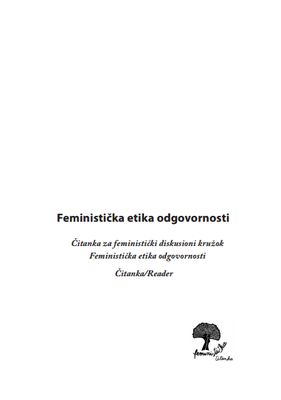


Keywords: Serbia; national program; ethnicity; multiethnicity; trials; war crimes; political ideas; conservative; duke Mihailo; Vojvodina; taxes; Slobodan Milošević;
Neville Chamberlain spoke for millions of his contemporaries when, at the height of the Munich Crisis, he lamented the prospects of going to war over ‘a faraway country’ inhabited by ‘people of whom we know nothing’. The prime minister was, of course, speaking to his fellow Britons about Czechoslovakia. But he could have just as easily used these same words to characterize the Anglo-American world’s knowledge - or concern - about the lands and peoples of the entire region between Germany and the former Soviet Union. A half century later we still know very little about what the Germans call Mitteleuropa, and even less about its history. Even today, as the world press reports recent events in the former Yugoslavia in terrible detail, it has never explained why there is such intense ethnic conflict throughout Central Europe. One tragic consequence of their ignorance has been the incessant, but incorrect allusion to "age-old hatreds" that helped desensitize America’s public and politicians to Slobodan Milošević’s carefully orchestrated campaign of ethnic genocide. We have many excuses. The region's languages are dissimilar to anything we speak. Its multiplicity of intermingled ethnic and linguistic groups challenges the most curious. It boasts no great power to attract our admiration or concern. And, it is not especially strategic or important to us. It may have been only a century ago when Bismarck warned that "the Balkans are not worth the bones of a Pomeranian grenadier", but his advice has guided the statesmen of the West for centuries. But our lack of knowledge or commitment does not mean that we have not played a major role in shaping its past, present, and - as it now seems - future. Although it is true that Central Europe has many endemic problems, the current crisis stems in great part from the West's imposition of its own values and solutions on a region about which it knows little - and cares less. Unfortunately, those in the public sector who mold and make this country’s policy have shown little interest in reading serious historical scholarship. As a result, crucial insights have been lost to the frantic schedules of journalists, who prefer to get their "historical background" from the flip clichés and breezy accounts other journalists. Nor have historical insights gained currency among politicians, who have less time and inclination to read much more than a daily news summary, the requisite opinion polls, and the occasional journalistic account. Thus President Clinton’s memorable remark at a press conference in 1995, in which he justified his belated decision to intervene militarily in Bosnia by proclaiming that he now understood the situation, having just read reporter Robert Kaplan’s Balkan Ghosts. Even those social scientists who serve as area specialists for central Europe have tended to restrict their historical background to the previous generation or two, failing to see how anything that occurred before World War II could possibly inform our understanding of the events of the last decade; hence the broad currency given to political scientist Susan Woodward’s Balkan Tragedy: Chaos and Dissolution after the Cold War, which convincingly ascribes the events of the last decade to a failure of that country’s governmental leaders and institutions, without regard to underlying, historically-informed cultural forces that might have prompted that collapse. The devaluation of history by the public, press, politicians, and social scientists presents a formidable challenge to us as historians. Surely we have a vocational interest in reminding them of our ability to discern the continuity between the past and present as an instrument for determining the likely course(s) of future developments. To this I would add a second, moral imperative to repay the tax- and tuition-paying public that sustains us by contributing to the formulation of public policy. The past decade has exposed us to the tragic alternative. In the aftermath of Srebrenica, Operation Storm and the successful NATO intervention, there has evolved a broad consensus that attributes the war, genocide and the subsequent need for costly, long-term Western intervention to our failure to learn from the lessons of history. I would suggest that part of our responsibility lies in a failure of historians to teach these lessons beyond the narrow confines of the Ivory Tower. Perhaps most remiss have been Habsburg scholars, who have failed to share what they have learned about the multiethnic experience in a "western" institutional environment that upholds the rule of law and codes of professional conduct. To Balkan and Habsburg historians alike, I say that it is not so difficult for a reasonably intelligent person to understand how we have gotten to this terrible juncture in Central Europe, or to envision where we are heading. The answers to our questions are not unteachable, just untaught. Looking over the events of the past decade, I would suggest a number of historically informed insights that bridge the gap between scholarly discourse and the lay public’s self-professed factual ignorance and conceptual confusion.
More...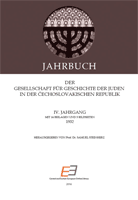
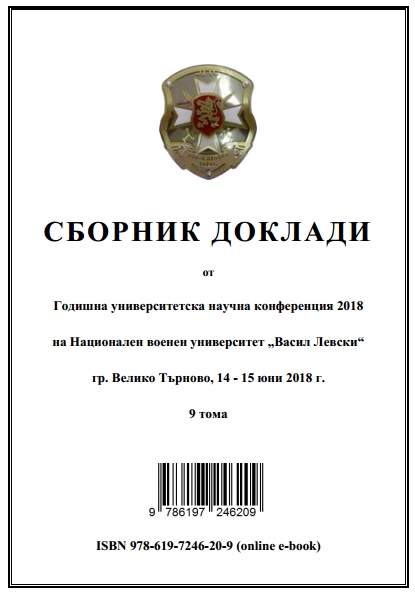
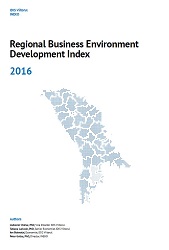
Over the last eight years, IDIS “Viitorul” has acquired a great deal of experience in strengthening the Moldovan business environment by having established the National Business Agency (NBA), granting it the needed support. The National Business Agency is an informal advocacy platform for business environment, which brings together some 35 business associations and the Chamber of Commerce and Industry around the discussion table. Lately, the NBA promoted a series of business environment priorities through the public-private dialogue. Hence, in 2015, IDIS Viitorul created the Local Business Agency with the support provided by the Chamber of Commerce and Industry, with the aim to foster economic development of regions through the involvement of business environment representatives in the decision-making process. In this way, the business environment of country districts had the opportunity to set forth its priorities at the local level to be subsequently promoted into the authorities’ public agenda through IDIS Viitorul and the Chamber of Commerce and Industry.
More...
Keywords: status of Kosovo; society; politics; Serbia; Albania; national policy; EU integration; economic development; ecology;
The edition “Moving towards a Sustainable Society in Kosovo” provides insight into the activities the Helsinki Committee for Human Rights in Serbia realized under the project of the same name. Serbia’s policymakers have managed to prolong the resolution of the Kosovo status for more than a year and thus fuel the regional vulnerability. Encouraged by Russia’s support and its embargo on the UN Security Council resolution that could have laid the foundations for Kosovo’s future status, the official Belgrade has been toughening nationalistic rhetoric and focusing on Kosovo as the top priority of the agenda of national interest. Such an attitude has turned the relations between Albanian and Serb communities in Kosovo even more delicate. For, the drawn-out status debate has overshadowed key issues of the Kosovo society, economy and interethnic relations between Albanians and Serbs and other minority communities. Two panel discussions, “Human Security in Kosovo” and “Framed Trials of Kosovo Albanians,” the Helsinki Committee organized with the assistance of partner organizations from Pristine probably best testify the need for interethnic dialogue. This edition carries integral proceedings of those gatherings. The workshops – described in this edition – one in the Serb enclave of Plemetina and another in Pristine bringing together Serb and Albanian women are also illustrative of Belgrade’s attempt to choke any rapprochement between Serbs and Albanians and of such policy’s detrimental effects on Kosovo Serbs. The rhetoric of confrontation and the emotion-fueled delusion that Kosovo would remain a part of Serbia have dominated Serbia’s political and social scene for the past twelve months. This is why this edition also brings to the public eye relevant discussions in the Serbian parliament, the text of the “Resolution on the Need for Just Solution of the Question of the Autonomous Province of Kosovo Based on International Law” that was unanimously adopted in late July 2007, as well as major Kosovo-related addresses by highest state officials. However, Serbia does have a political alternative to such mainstream: the Liberal Democratic Party /LDP/, which entered the parliament following the January 2007 elections. The LDP alternative document on Kosovo, submitted for the parliamentary consideration, is also presented in this edition. Last but not least, some illustrative commentaries, run in the Committee’s magazine The Helsinki Charter – scrutinizing Kosovo developments along with other key issues of Serbia’s modernization and Europeanization – are here available to readers as condensed reading matter.
More...
Keywords: Serbia; intellectuals; war; humanists; Marina Cvetajeva; journalists; national programs; historians; gender; women rights; standard language; eschatology; politics; dissidents;
This volume, Intellectuals and War, follows on the heels of last year’s publication of Another Serbia. Like the latter, it is the result of the work of the Belgrade Circle. As the reader will recall, Another Serbia is a collection of over eighty talks given by members of this association of independent intellectuals and their guests, during ten of the sessions of the Belgrade Circle held every Saturday from the beginning of April to the end of June 1992. Intellectuals and War brings together some fifty texts, which were presented as part of the series »Intellectuals and War« organized every other week, for ten sessions from the beginning of October 1992 until the end of February 1993. At a time when every call for peace, national tolerance, and liberal democracy was being confronted with scorn, disdain, and open ridicule; at a time, that is, when even the most cautious doubts about the utility of the war, which might deflate the state mythology were being denounced as acts of treason committed by slanderers of the National Idea, the Belgrade Circle organized the thematic series, »Another Serbia« and introduced itself to the domestic public as one of the truly rare associations (not to mention political parties, the few exceptions not withstanding) whose members refused on principle to contribute to the destruction of other nations and the demise of their own. With this series and, particularly, with the publication of our book by the same name, the expression »Another Serbia« became a motto for all those who sooner or later came to see the dangers of the nationalist policies of the past five or more years. Unfortunately, many of the dark forebodings expressed in that first series proved to be true. With tragedies mounting at an alarming rate, many words that then sounded very strong, sometimes even, strident, have become but mild reproaches today. Words that once, only a year ago, were just short of blasphemy, have long since become commonplace in the mildest critical discourse in which almost everyone engages. Yet, in looking through the pages of Another Serbia today, one issue emerges from a number of the contributed works that still has not permeated public consciousness deeply enough and has only with great difficulty found its way into the conscience of those individuals to whom it directly refers. This is, of course, the matter of the responsibility of intellectuals for spreading national intolerance, inflaming hatred, advocating war, and – eventually – for instigating crimes and barbaric destruction and causing the isolation, poverty, denigration and scorn which has since come our way. With this in mind, the Belgrade Circle, as an association of – to repeat – independent intellectuals, decided to organize its second thematic series of discussions around this sensitive and uncomfortable question, which is often protected by taboo. The Belgrade Circle did not act impetuously in calling for an open examination of the role of public-opinion makers in the Yugoslav tragedy. Nor did it do so only after having seen the tragic results of conspicuous blunders by writers, scholars, and religious figures in irresponsible national mythmaking or – worse – in open incitement to war. Such a decision was part of the original motivation guiding the future founders of the Circle. Long before the disintegration of the country and before borders were redrawn, territory occupied and people expelled from their homes, they witnessed a number of their colleagues working as free agents or, more often, as institutional propagandists, dutifully reviving national myths, recounting the victims of pats years as if infatuated with death, reworking the ideology of land and blood and skilfully explaining the need for the South Slavic peoples to »separate« from one another once and for all. Seeing this, it became clear to the future members of the Belgrade Circle that it would not be long before these words were turned into deeds. The common denominator for the some twenty philosophers, sociologists, scientists, artists, and journalists who joined together in the Belgrade Circle was, in fact, the decisive refusal to participate in such undignified activities, which could only end in the horrors of war. In its founding Act, and later in number of public statements and individual appearances by its members, the Circle pointed to the responsibility of the »national intelligentsia« and »national institutions« for war and condemned their abuse of public speech. Although against political trials as a matter of principle, the Belgrade Circle argued in its first public statement that not only should politicians, military leaders, and those directly involved in executing their policies be held accountable for their deeds, but also intellectuals responsible for inciting war and causing crimes against humanity, the destruction of cultural and historical treasures, massive displacement of populations and the exile of numerous distinguished creative figures, and the involuntary flight of educated young people. The fact that it was precisely those individuals who given the nature of their work, should have been among our ranks, but chose instead to put their talents, knowledge, and reputation in the service of legitimising a new collectivism, who were the first to poke fun at the Circle and attack it with angry, even threatening messages made it convincingly clear that this important initiative was directed to the right address. At the crucial moment when the class-based identity of society began to collapse from within, these intellectuals, rather then putting their strength and authority into the democratic enlightenment of an apathetic citizenry actively helped to enthrone another new unifying principle, a new unio mistica which would, this time, be based on an artificially awakened and stimulated national identity. Thanks largely to these efforts, the opportunity to become a society of free individuals who act as autonomous citizens in the political sphere and not as anonymous members of the one and only Class, on Nation was again – and, again for a long time – gambled away. Put simply and crudely: once again, »ideologues«, »clerics«, and »guard dogs« have sold us a bill of goods. Few or the participants in the series »Intellectuals and War« were prepared to say that all »national intellectuals« were guided by evil intentions, hatred toward other peoples, vicious greed, futile craving for fame and honour, or the desire to gain the favour of the new/old rulers. It was clear to our authors that there were honest and intelligent people among these »national intellectuals« who sincerely believed that after the fall of the »old regime« it was more important to resolve the national question than to work for the establishment of parliamentary democracy. Reality – as is most often the case – provided them with a real basis for dissatisfaction. However, just as the framers of the idea of the social revolution before them, they turned to the implementation of the national revolution, without paying attention to the means those contracted do to the job – nurtured as they were in our rich tradition – would more than likely use. Thus, it is hard to resist the conclusion that the war began in words. Any rational observer of the now distant events could reasonably have expected the abbreviated series of exchanges between abstract ideas and concrete acts to turn easily and rapidly into bullets. After all, doesn’t the saying go: the pen is mightier than the sword!? A majority of the authors contributing to this volume, share the belief that if intellectuals – who have since become peace advocates – are now amazed and horrified by the sea of spilled blood, the ruined cities and villages, the rivers of displaced and uprooted people, and the previously unimaginable faschisation, impoverishment, and criminalisation of society, they must – if nothing else – face up to their own professional and moral responsibility for this. But this is a question of individual conscience which no one may or should pas a judgment. Some of the text, however, express the belief that another kind of responsibility – one that presumes more tangible consequences than merely having to confront oneself – must surely fall on the shoulders of that »portrait gallery« of our intellectual guard who have consciously advocated war and misted the people, captivating them with otherworldly messages, promising them the heavenly city, submerging them into the past, offering them dignity through force, and turning them away from the most natural desire to live a better and happier life with Others rather than in isolation from the outside world, imprisoned by self-love. One moment openly, the next moment covertly, they supported the consolidation of an authoritarian and indifferent regime, which would carry out the dirty work for them and for the greater glory of the Nation. They graciously allowed the forces of evil to strike, always ready to put the intellectuals’ most daring plans into action. Sometimes participating directly in the government, but more frequently, acting in the shadows as advisors to the absolute ruler and his priests and in collusion with our Volksgeist, these intellectuals were not prepared to take a stand at those moments when the people appeared to have come to their senses. They introduced even greater discord into the already confused political scene as they entered into the ranks of political parties that had the appearance of becoming democratic. Through both their silence and action, they allowed the uneducated electoral body to surrender itself to the one and only real leader. With these texts in front of us, it is tempting to outline a series of »generic-types«, that is, to construct a certain number of »ideal types« from among our national intellectuals. It is easy to understand those readers who would be happy with a string of unique caricature-like portraits. We have merely to think about all those crazed painters, poets of hearth and home, ominous prophets, patented demystifyers of planetary conspiracies and experts in deconstructing the »new world order«, ethno geneticists and amateur historians who trace their nation’s roots to ancient, even prehistoric times, former Marxists who find solace for their collapsed ideology in the »sweet joy of belonging« to the Nation, indefatigable drafters of geopolitical maps, and journalists and columnists who have persistently presented our unsophisticated readers and television audiences with an up side down picture of history and the world. But for now, let’s just keep these in mind: as, in this brief introduction we cannot even hope to sketch out such a typology, much less, to take on a detailed study of some prominent cases. What we can do is hope that a future systematic examination of the role of intellectuals in the wars we are going through will enable us to arrive at an answer to the question posed by the authors of this volume. They themselves have not been motivated by the ambition to offer an answer now and this motivation could hardly be sad to be common denominator among the various texts, which differ both in genre and in the opinions they present. As in Another Serbia, the contributors to Intellectuals and War have their own views and are alone responsible for their words.
More...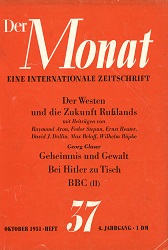
Please download the Introduction-PDF which you find below to see en détail what you can find in this issue Thank you.
More...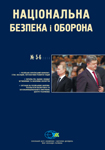
THE RUSSIA-UKRAINE CONFLICT: CURRENT SITUATION,CONSEQUENCES, PROSPECTS // CHAPTER 1. THE CURRENT STATE OF UKRAINE-RUSSIA RELATIONS // CHAPTER 2. INTERNATIONAL ASPECTS OF THE RUSSIA-UKRAINE CONFLICT // CHAPTER 3. PROSPECTS OF UKRAINE-RUSSIA RELATIONS: CONCEPTUAL APPROACHES AND PRACTICAL STEPS // UKRAINIAN AND FOREIGN EXPERTS ON KYIV-MOSCOW RELATIONS // DIPLOMATS ON THE RUSSIA-UKRAINE CONFLICT // RUSSIA-UKRAINE CONFLICT: EXPERT ASSESSMENTS // CHALLENGES AND PERSPECTIVES OF UKRAINE-RUSSIA RELATIONS: PUBLIC OPINION // POLITICS:HOW TO STOP THE WAR? // UKRAINE: AN INEVITABLE CONFRONTATION OR AVOIDABLE CONFLICT? // REFLECTIONS ON THE NEW EASTWEST DISCORD // ECONOMY: DEGRADATION OF THE UKRAINE-RUSSIA ECONOMIC RELATIONS: WHAT IS NEXT? THE CRIMEA ISSU: EREINTEGRATING CRIMEA: METHODOLOGICAL ASPECTS // THE POINT OF NO RETURN
More...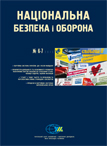
PARTY SYSTEM OF UKRAINE BEFORE AND AFTER MAIDAN: CHANGES, TRENDS, PUBLIC DEMAND // CHAPTER 1. PARTY SYSTEM OF UKRAINE IN 2010-2015: STAGES AND SPECIAL ASPECTS OF EVOLUTION // CHAPTER 2. PARTY SYSTEM AFTER MAIDAN: IMPLICATIONS AND FACTORS // CHAPTER 3. DEVELOPMENT PROSPECTS OF POLITICAL PARTIES: CONTENT OF PUBLIC DEMAND // CHAPTER 4. RECOMMENDATIONS // Main theses of the Ukrainian political parties’ election programmes that have a parliamentary faction // Main theses of the Ukrainian political parties’ election programmes that have gained over 1% of people’s votes // POLITICAL PARTIES IN UKRAINE: CURRENT STATE, DEVELOPMENT AND ENVIRONMENT // POLITICAL PARTIES IN UKRAINE: EXPERT OPINIONS // CURRENT STATE AND PROSPECTS OF DEVELOPMENT OF PARTYSYSTEM IN UKRAINE: EXPERT ASSESSMENTS // POLITICAL PARTIES AND PARTY SYSTEM OF UKRAINE AT PRESENT: PUBLIC OPINION // PARTY SYSTEM OF UKRAINE AT PRESENT: CHALLENGES, PROBLEMS, PUBLIC EXPECTATIONS // Session 1. Development of Ukraine’s party system against the background of modern European trends // Session 2. Current state and development trends of political parties in Ukraine // IN SEARCH OF THE “CORE ELECTORATE”: HOW SHOULD PARTIES REACT TO AN INDIVIDUALISTIC SOCIETY? // PARTY SYSTEMS OF EU MEMBER STATES
More...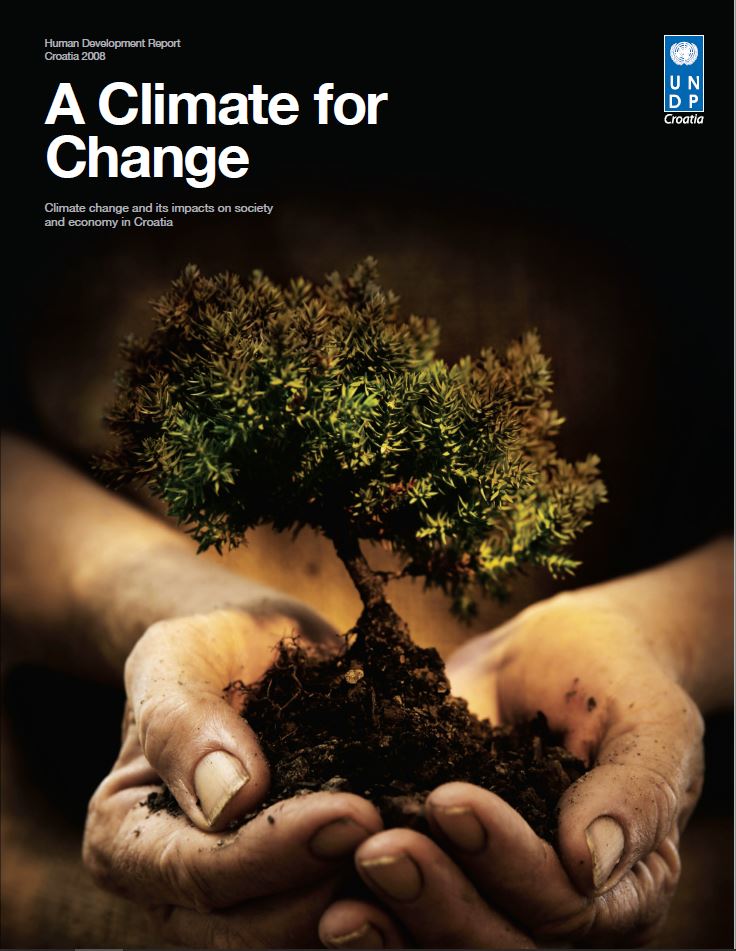
Keywords: Climate Change; Croatian ecology;
Both the Government and citizens are concerned and interested in the climate change issue. The Governmentis already pursuing several strategies to reduce greenhouse gas emissions, thus allowing the Human DevelopmentReport to focus on identifying key gaps and to provide specific recommendations on “climate-proofing”human development strategies. In addition, the Report can help to address public concerns: in a recent survey, 8 out of 10 Croatians felt that climate change was really happening, and of that group, 4 out of 10 thought itworse than experts were saying. // While this Report is not meant to be a comprehensive overview of all aspects of climate change, it does reflectthe breadth and depth of research that has been done in many sectors to date, and it provides a link between aglobal phenomenon and the everyday human development issues facing Croatia. The research and analysis in thisHuman Development Report indicates that, while climate change is likely to pose serious threats to human developmentin Croatia, it also has the potential to bring several beneficial opportunities. The “climate for change” thatcurrently exists in Croatia will provide the country with the motivation it needs to rise to the challenge.
More...